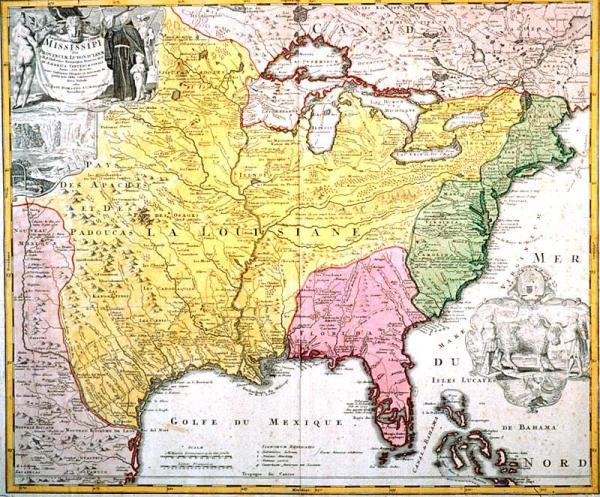Amplissimæ Regionis Mississipi (sic) Seu Provinciæ Ludovicianæ à R. P. Ludovico Hennepin Francise Miss. In America Septentrionali [An Enhancement of the Mississippi Region and the Louisiana Provinces from R. P. Ludovico Hennepin, Franciscan Missionary]

Colonial Louisiana, North America, southeast United States; Rio Grande, location of Indian tribes, forts, Hennepin, Niagara Falls.
Nuremberg
Another original located 10189; facsimile copy located Acc. # 13065. See, Goss,"Mapping of North America" #49. Editions of this map were included in Homann's "Atlas Geographicus Major Norimbergae Homannianis Heredibus" published 1763. Label from 1996 exhibit:
Title cartouche, topped with a bison head, represents the conversion of indigenous peoples to Christianity. A missionary (probably a depiction of Hennepin) holding a cross, followed by a musket-bearing European explorer, faces a nude male. This figure, depicted in the contrapposto position and with European facial features, looks more like a Roman statue than an Indian. The inset seen directly below depicts Niagara Falls and animals that appear to be beavers.
The middle right cartouche features the coat of arms of the Company of the West. A man wearing Brazilian Indian attire and an Indian woman bearing her child in a cradle board flank a bison. An opossum hangs above the buffalo. The bird seen below may be the artist's misconception of a pelican.
Label copy from 1996 map exhibition, applied to original of this map (on loan from Ralph Lupin):
itle cartouche, topped with a bison head, represents the conversion of indigenous peoples to Christianity. A missionary holding a cross, followed by a musket-bearing European explorer, faces a nude male. This figure, depicted in the contrapposto position and with European facial features, looks more like a Roman statue than an Indian. The inset seen directly below depicts Niagara Falls and animals that appear to be beavers.
The middle right cartouche features the coat of arms of the Company of the West. A man wearing Brazilian Indian attire and an Indian woman bearing her child in a cradle board flank a bison. No other animal in North America made such a profound impression on Europeans as the bifalo, an animal they had never before encountered. Numerous illustrations of it were made, all showing a shaggy ox-like animal because oxen, unlike buffalo, were native to Europe. An opossum hangs above the buffalo. The bird seen below may be the artist's misconception of a pelican.
Derivative of Deslisle's "Carte de la Louisiane et du Cours du Mississippi," although Homann's rendition delineates a slightly larger area and places New Orleans on the wrong side of the Mississippi River.
Title cartouche, topped with a bison head, represents the conversion of indigenous peoples to Christianity. A missionary (probably a depiction of Hennepin) holding a cross, followed by a musket-bearing European explorer, faces a nude male. This figure, depicted in the contrapposto position and with European facial features, looks more like a Roman statue than an Indian. The inset seen directly below depicts Niagara Falls and animals that appear to be beavers.
The middle right cartouche features the coat of arms of the Company of the West. A man wearing Brazilian Indian attire and an Indian woman bearing her child in a cradle board flank a bison. An opossum hangs above the buffalo. The bird seen below may be the artist's misconception of a pelican.